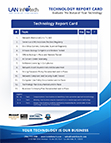How Does the Utility Bill Scam Work?
The frightening thing about the utility bill scam is its sheer simplicity. A consumer receives a seemingly legitimate call, email or bill from what appears to be a collection agency. The scammer purports to be a bill collector for one of your utility companies and informs the consumer that their bill is past due. In some cases, they even threaten the consumer with shutting off services.
Because these amounts are usually relatively small, consumers are more apt to address the issue in order to resolve the issue quickly. The scammers use highly aggressive and threatening language to induce panic and urgency in their victims.
That’s where the problems accelerate. Unsuspecting consumers end up handing over payment information to scammers who can then use the payment information to wipe out bank accounts or run up thousands of expenditures on credit cards.
Why Do People Fall for the Utility Bill Scam?
There are several reasons the utility bill scam is so effective. For one, there is a sense of urgency and dire consequences. Imagine receiving an urgent call in the middle of a sweltering heat wave that your electricity is about to be cut off. That means no air conditioning and no power for your refrigerator or freezer.
Instead of playing it cool and checking on their payment history, the victims want to get the issue resolved and not risk any service interruptions.
Few people are going to pause, check the phone number or email, or do a quick Google search that would alert them that they are about to become the victim of a fraudulent hoax.
In many cases, the payment cannot be recovered, leaving victims in the lurch.
How Can Consumers Stay Protected?
There are several things people can do to avoid being preyed upon:
- Do not click on a link or call a phone number and provide personal information, especially payment information
- When in doubt, go to the utility company’s official website to log in to your account. Call a customer service rep for the company and inquire about your account
- Be sure utility websites begin with https, indicating they are secure
- Notify the utility about any scams being pulled in their name
- Do not pay with a wire transfer, prepaid debit card or gift card on any utility account
- If you receive notice of an overpayment, do not provide account information to have it deposited. Instead, ask for a credit on your next bill
- If someone shows up at your door asking for information or payment, ask for a company ID. Do not let them in your home. If they cannot provide an ID, call the police
- Even if you have a scheduled appointment, verify the act with the utility at a website-provided phone number
- Be suspicious if their ID, vehicle or clothing do not seem legit
- If you feel you are in danger, call 911
Knowing how to identify and prevent cyberscams is an important safeguard for individuals and businesses alike. At LAN Infotech, we provide network security assessments to identify vulnerabilities on your network. For a free, no-obligation consultation, contact us today.

LAN Infotech is a Microsoft Cloud Services Provider, IT Managed Support company and a leader in helping law firms, nonprofits and medical organizations deploy cloud solutions, manage computer networks, keep data protected and top technology management company. Businesses like yours need technology support to run highly-effective organizations.


